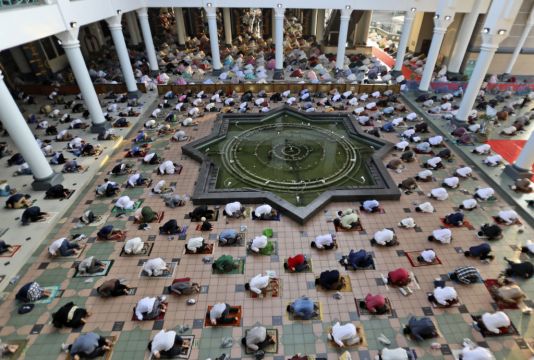Muslims celebrated Eid al-Fitr in a subdued mood for a second year as Covid-19 forced mosque closures and family separations on the holiday marking the end of Ramadan.
Worshippers wearing masks joined communal prayers in the streets of Indonesia’s capital, Jakarta.
The world’s most populous Muslim-majority nation allowed mosque prayers in low-risk areas, but mosques in areas where there was more risk of the virus spreading closed their doors, including Jakarta’s Istiqlal Grand Mosque, the largest in Southeast Asia.
Indonesians and Malaysians were banned for a second year from traveling to visit relatives in the traditional Eid homecoming.

“I understand that we all miss our relatives at times like this, especially in the momentum of Eid,” Indonesian president Joko Widodo said in televised remarks.
“But let’s prioritise safety together by not going back to our hometowns.”
In the southern Philippines, coronavirus outbreaks and new fighting between government forces and Muslim insurgents in one province prevented people from holding large public prayers.
Instead, most stayed in their homes, while in Maguindanao province many families displaced by recent fighting marked the holiday in evacuation camps.

In Malaysia, Prime Minister Muhyiddin Yassin unexpectedly announced another nationwide lockdown from Wednesday until June 7 to curb a spike in cases.
Interstate travel and all social activities are banned, which means that like in Indonesia, Muslims cannot visit each other or family graves.
Mr Muhyiddin acknowledged that many are angry with the lockdown but defended the need for drastic measures, saying hospitals have almost reached their capacity.
He said: “Is this government tyrannical? But I am not a tyrant.
“Imagine if you have guests over, then the virus will spread … If the guest visits 10 homes, then 10 families will be infected with Covid-19 and in the end as soon as (Eid) ends, the number of positive cases in the country could jump to tens of thousands daily.”







